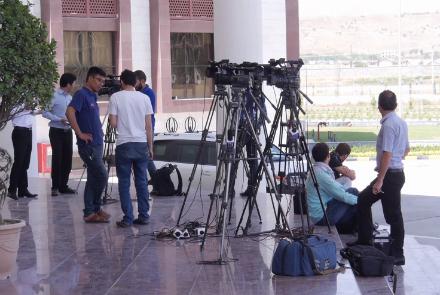While September 28 marks the International Day for Universal Access to Information, Access to Information Day, a number of Afghan journalists said the National Unity Government is not giving them on-time information on certain incidents in the country.
According to the journalists, Article 10 of the amended version of the Law on Access to Information states that government departments shall share information to help the people have access to it, though government departments mostly ignore and violate the article.
Elyas Nawandish, an editor at Etilaatroz Newspaper, said that few weeks ago, they had requested a government department to provide them information for completing an investigative report, but so far, he said they have not received any response on their request.
He said other letters of the media outlets for acquiring information from government institutions have remained without response by the state offices.
“We visit government offices for days, weeks and months for information and finally we cannot get anything,” said Nawandish.
Some journalists from Ghazni province said they do not have on-time access to information in the province and mostly they face problems when they want to get their necessary data from government institutions.
“Lack of access to information affects media’s reputation and trust among the people,” said Toryalai Tabish, a reporter in Ghazni.
Three years ago, the Monitoring Commission on Access to Information was established and a new Access to Information Law was approved early this year to promote access to information by people and reporters, but according to a number of journalists, the commission and the new law have not met expectations.
“Government officials do not share information with media properly,” said Hamid Mayar, a reporter.
“Not sharing information with media is a weakness of government,” said Qais Abbasi, a reporter.
The new Law on Access to Information states that government departments shall pass on news information to reporters and media outlets within 24 hours and deliver other information within 10 days.
The law has six chapters and 41 articles and has been viewed as proper law, though journalists said that it is not implemented properly.
This year, in a rating by the Global Right to Information Rating, the new Law on Access to Information in Afghanistan has been placed on the top of the table among the law from other countries in the world.
This rating is being done annually by Canada’s Center for Law and Democracy and Access Info Europe. Afghanistan’s former Access to Information Law was placed at 70th row of the rights rating.
“If government does not cooperate with the (media) commission, does not provide them equipment and does not change information sharing as a culture, then being on the top of the table is not important, because in terms of implementation it will be at the bottom of the table,” said Danish Karokhail, former member of the Monitoring Commission on Access to Information.
The National Unity Government officials, however, always have talked about access to information and information sharing as one of their main achievements.
This comes after NAI, an organization supporting open media in Afghanistan, said last month that in over three years of the National Unity Government, violence against journalists has increased by four times comparing with previous years.
According to NAI report, at least 620 cases of violence against journalists were recorded in the past three years.


